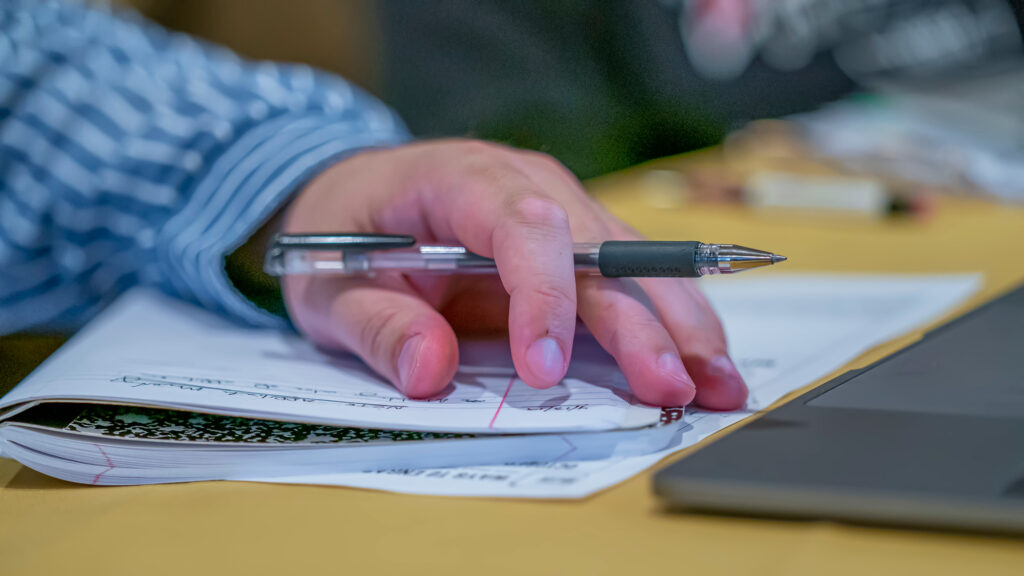This blog post was written by NCTE member Lee Ann van der Kwast.
At this point in the new year, New Year’s resolutions have already failed. In fact, Forbes Health suggests that resolutions are doomed to fail by January 17. There are many reasons that lead to this failed attempt in change. However, to make a meaningful resolution, it starts with authentic reflections in order to make real progress. Personally, I don’t believe that resolutions are a one-time-of-the-year declaration to make some life changes, but instead it is more valuable to make meaningful reflections and changes throughout one’s lifetime. In my Creative Writing ELA elective, I wanted to explore the place reflections have in the writing process, so I did a side research for the first semester of the school year. I required reflections after each piece of writing, and then I gave a final survey to uncover the student perspective on adding reflection to the writing process. From the data and student feedback, writing reflections have a place in the writing process to allow students second-chance learning, authentic awareness of progress, and realistic goal setting.
In this way, adding reflections to the writing process offers students a moment to become self-aware of their strengths and weaknesses in their writing, analyze their own personal writing process, and then set manageable goals for themselves when they embark on their next writing piece. Reflecting on writing is not a new concept, but it is one step that often gets brushed over in the traditional writing process (pre-write, draft, confer, revise, edit, publish, repeat). Where exactly does reflection fit into that cyclical writing process? As a writer and an ELA teacher, I reflect all the time almost subconsciously as I am writing a research paper, grad paper, short story, or poem, and as a teacher I reflect after lessons, units, and assessments. Students need the opportunity and experience to reflect on their own writing.
Are we preparing our students enough for authentic self-reflections? In many professions employees are evaluated on their work performance and it often involves employee self-reflection and reflection of employer feedback. Reflections are also part of an educator’s professional evaluation process because reflection is a part of the intrinsic desire to grow in a specific area. I was curious about how my students viewed adding reflection to the writing process. I wondered if they found the value of authentic self-reflections throughout the writing process. Out of 15 students who took the survey, 8 students reflected after every assignment, 6 students mostly reflected after each assignment, and 1 honestly noted that they wrote more than they actually reflected. Out of 15 students surveyed, 12 students identified that “reflections had a direct benefit as a writer” and 3 students responded no. In the student survey, the students had “final thoughts about writing reflections as part of the writing process (pre-write, draft, confer, revise, reflect, final product).”
“It was very helpful and I’ll use that [reflection] as a tool for my future writing process.”
“. . . when I looked at them [reflections] it helped me learn what I need to work on better.”
“They [reflections] helped me improve in my next creative writing piece, and I also learned about my writing process . . . ”
“I think they [reflections] benefited me as a writer because they gave me time to go back and read what I had written.”
From working with this group of students in creative writing class for a semester, I saw a growth in their writing skills over the course. Through reflections, the students also were able to see their growth. At the end of the semester, students put together a writing portfolio with all of their writing and reflections, and their portfolio began with a one-page reflection on their growth as a writer. Students practiced authentic reflections, and they were honest about their strengths (what they will keep doing on the next piece of writing), their weaknesses (what areas to improve upon), and the process they used in producing a final draft. The question about process was really the most important because students were honest about pre-writing, drafting stages and how meaningful their peer/teacher conferences were throughout the drafting. One area I am still considering is when to give the reflection. This semester I made reflections due when the final draft was turned in; it was interesting to see their initial responses before teacher feedback. Some students in the survey would have preferred reflecting after teacher feedback. I think there is a benefit to both ways, so I am considering a two-part reflection in the future simply by adding one more question: Now after teacher feedback, what are areas of strengths and weaknesses? Did the teacher’s feedback match what you previously responded to in your reflection? Explain.
Overall, from the survey and one-page reflection in their portfolio, students expressed growth as writers, and one contribution to that growth is authentic reflection. Making room for writing reflection is a necessary step in the writing process that equips students with the lifelong learning skill, to authentically reflect not on the end result, but on the process and ability to set realistic goals. Maybe there is hope for improved New Year’s resolutions after all, but only with authentic reflection on the process to reach goals. For writers, reflecting is a natural piece, but many students may not take a moment to pause and reflect on themselves as writers and on their individual process. But reflections teach students that in order to progress in an area, they need to take that moment and evaluate themselves as writers and individual learners. As I move forward and reflect on myself as a writing instructor, I am also going to add reflection to academic writing because being able to reflect is an essential part of growing and setting goals academically and professionally.
 Lee Ann van der Kwast is a ninth-grade English and creative writing teacher at Methacton High School in Eagleville, Pennsylvania, located in the suburbs of Philadelphia. This is her thirteenth year teaching secondary English. She is also a club adviser for the school’s annual creative arts magazine, which showcases the talented student and faculty artists and writers. Lee Ann believes that creative writing offers students endless possibilities to explore and grow as writers: “As an educator, it is imperative for me to give students an opportunity to explore their creativity through writing.”
Lee Ann van der Kwast is a ninth-grade English and creative writing teacher at Methacton High School in Eagleville, Pennsylvania, located in the suburbs of Philadelphia. This is her thirteenth year teaching secondary English. She is also a club adviser for the school’s annual creative arts magazine, which showcases the talented student and faculty artists and writers. Lee Ann believes that creative writing offers students endless possibilities to explore and grow as writers: “As an educator, it is imperative for me to give students an opportunity to explore their creativity through writing.”
It is the policy of NCTE in all publications, including the Literacy & NCTE blog, to provide a forum for the open discussion of ideas concerning the content and the teaching of English and the language arts. Publicity accorded to any particular point of view does not imply endorsement by the Executive Committee, the Board of Directors, the staff, or the membership at large, except in announcements of policy, where such endorsement is clearly specified.

